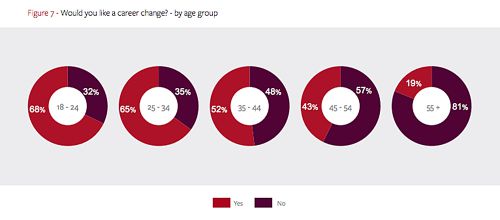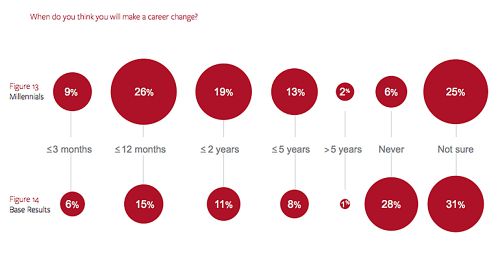NEWS: 66% of UK Millennials Want Career Change

More than half of UK Millennials want career change, according to new research by the London School of Business and Finance (LSBF), which interviewed 1,000 male and female professionals of different age groups from across the UK.
Even more surprising is that an overwhelming 47% of Gen Xs (people aged 35-50) are not happy with their careers either.
Julie Cannon, a career adviser at Futures, told Lucky Attitude that: “More mature people consider a career change as they often have less financial commitments and have more freedom to choose a job for enjoyment”
Peter Fennah, a career coach at Career Synergy thinks that Millennials want career change for different reasons than older generation.
He says: “Younger people are seeking challenges that allow them to gain feedback on their strengths and help define their identity through the work that they do. On the other hand, older people have a more developed sense of self and they are not looking to find their identities through their work.”
Most Millennials want to change careers in a year or earlier, older generations are more hesitant
Even though half of the UK workers want to change their careers, most of people have no idea when will they do it. However, Millennials, are more willing to leap.
Lack of financial stability, fear of failure, not having a clear understanding of how to, time required, and disruption to life are all blockers for people changing careers.
Millennials leave jobs for more money, Gen X’s leave for better work-life balance
According to the LSBF survey, the prime reason for Millennials to change jobs is more money.
However, Margaret Davies, an occupational psychologist and director at women’s development consultancy The Glass Lift believes that salary isn’t the main reason people leave: “Salary can be what’s called a ‘hygiene factor’, i.e. if people are dissatisfied with their prospects at work, then salary becomes a reason to move.”
Workers aged between 35 and 44 tended to be more interested in a career move that improved their work-life balance.
Overall, the over 55s are the most content workers in the UK, with just 19% looking to change career.
Shift in the workplace
Individuals now seek self-actualisation more than ever before and are utilising an authentic leadership approach alongside developing self awareness of strengths to become happier.
In some workplaces, career development is not possible or people are confined by their current circumstances, reducing their confidence to “move on”. So, as far as businesses are concerned, allowing professionals to develop and thrive within their current role, perhaps with the view that they will in fact move on at some point, will perhaps create higher levels of engagement.
The stigma of “job hopping” is vanishing, too. People no longer tend to stay in one position for many years, instead they change companies, industries, locations, careers more often and with more bravery.
It seems that they have more confidence, curiosity, drive to understand what they really want to do, what fulfils them and gives sense of accomplishment and that’s great!
Employees can learn more and focus on transferable skills that shape their future self. And for that reason, they are often going to choose jobs that encourage them to have a lot of those skills in particular. That’s why there is a particular interest in sales jobs right now, as well as similarly related areas because that is the kind of role where those skills can develop in earnest.
On the other side, there is the employer, who invests in talent and wants to retain it. Maybe if the companies start creating an environment full of support that enables identifying interests, personality traits, potential and particular talents, they would be able to develop their employees in the matching field and keep them.
If there is an opportunity to grow inside the company by moving departments or getting involved in other ways, their needs have a chance to be met. But first, these needs should be identified.
The question is: How do you engage staff when nearly 50% want to change careers, anyway?



